PCU Nurse Resume Examples

Jul 18, 2024
|
12 min read
Your ultimate guide to writing a PCU nurse resume: tips for highlighting your patient care skills. Learn how to stand out and secure a progressive care unit position with ease.
Rated by 348 people
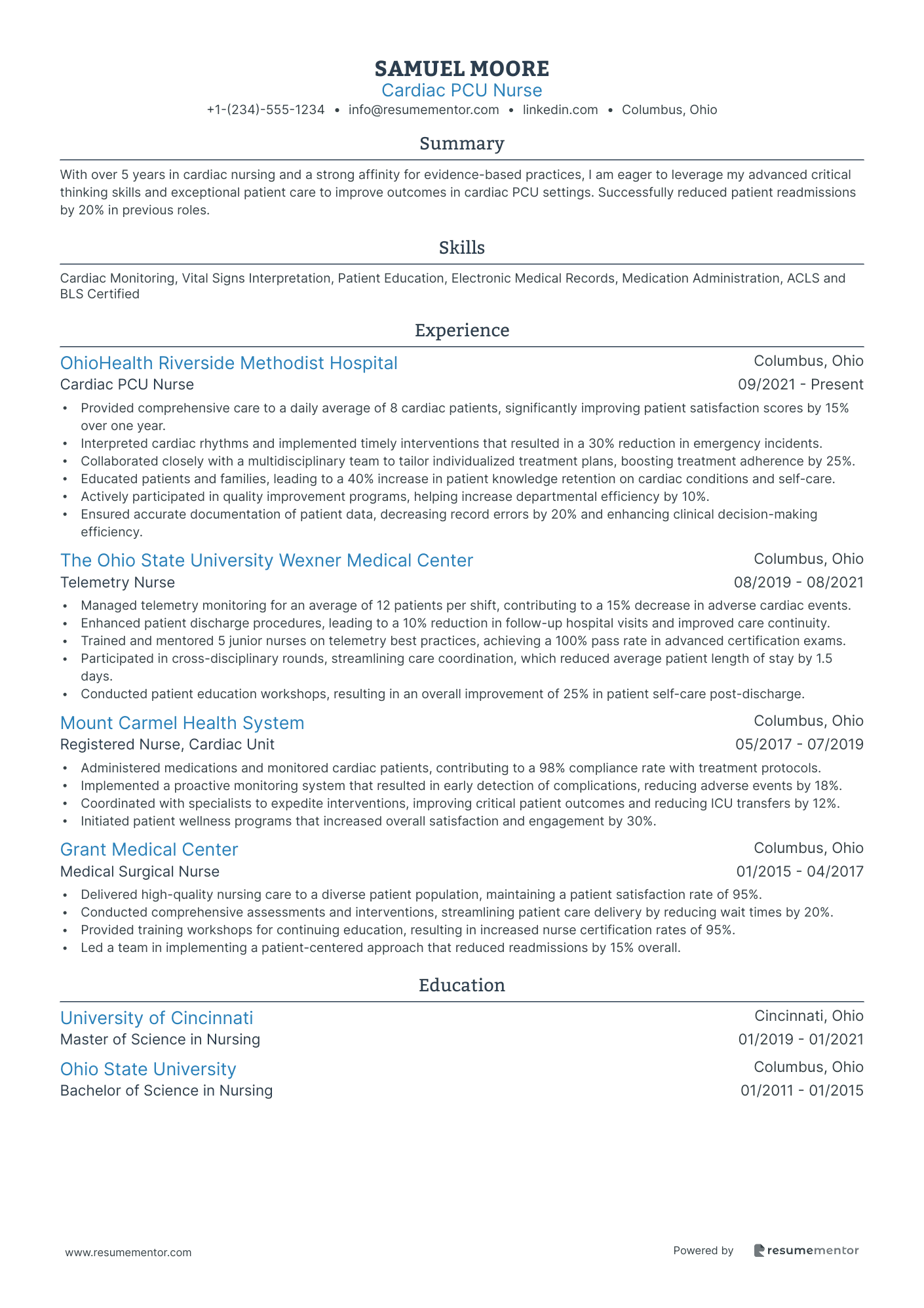
Cardiac PCU Nurse
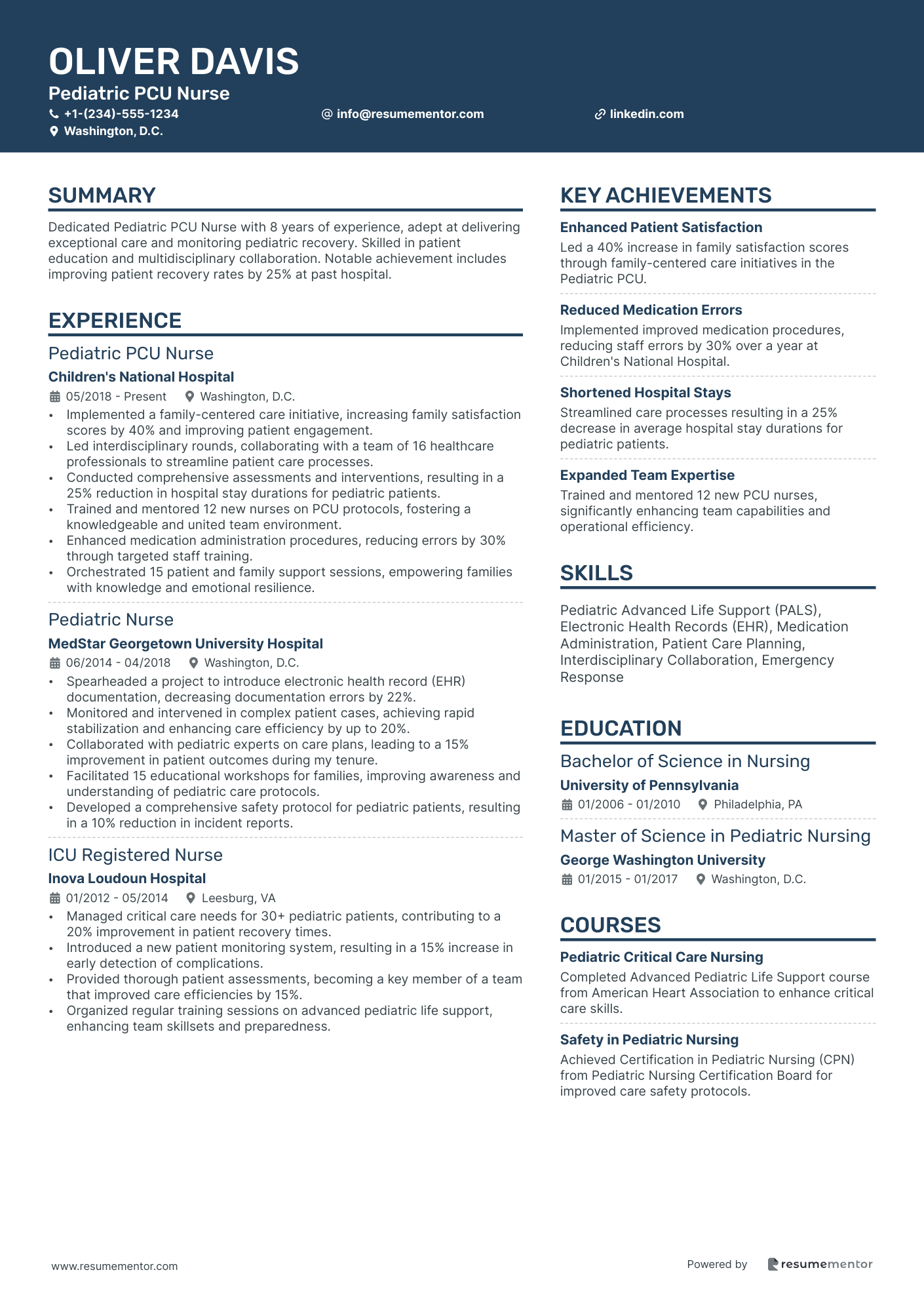
Pediatric PCU Nurse
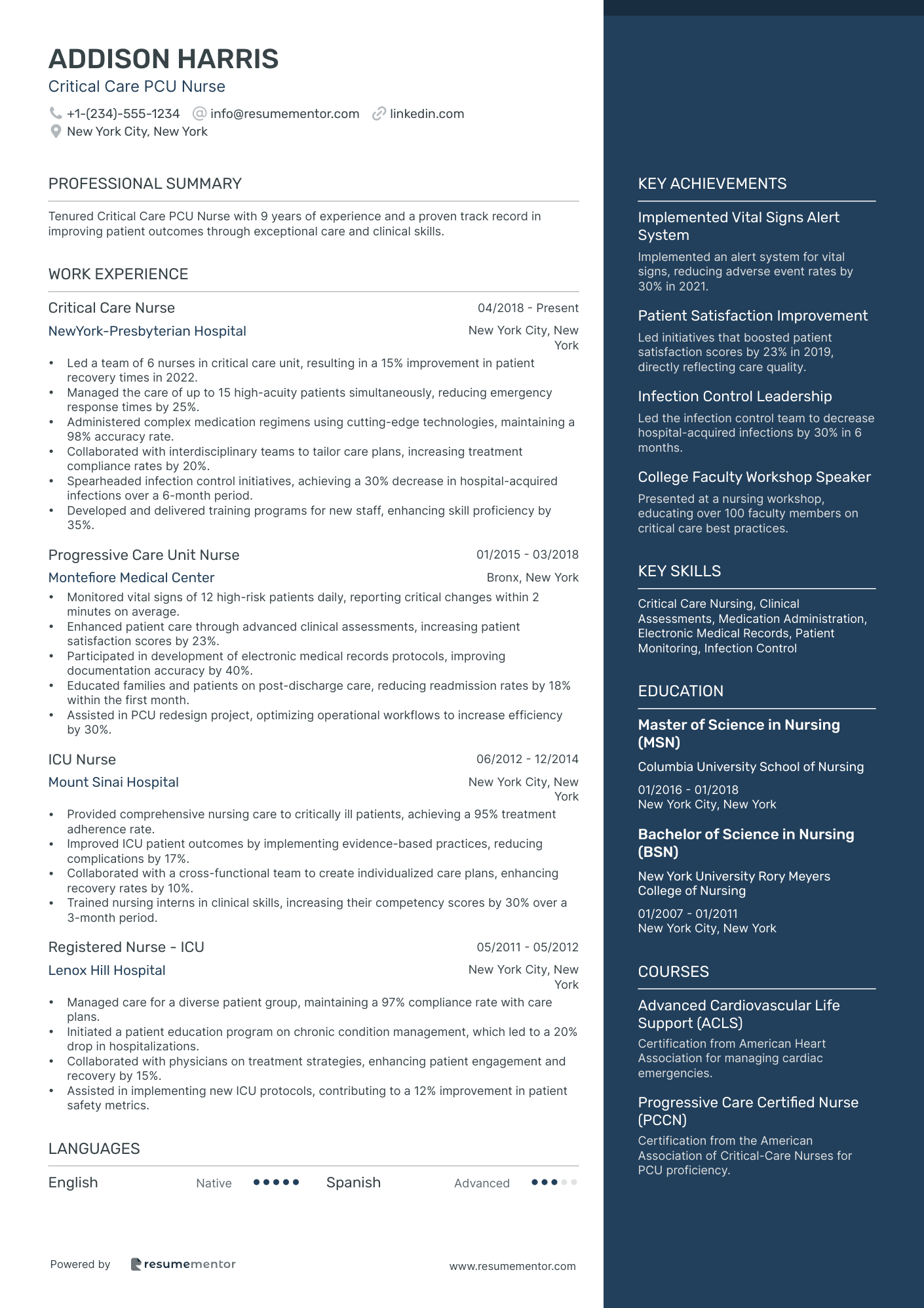
Critical Care PCU Nurse
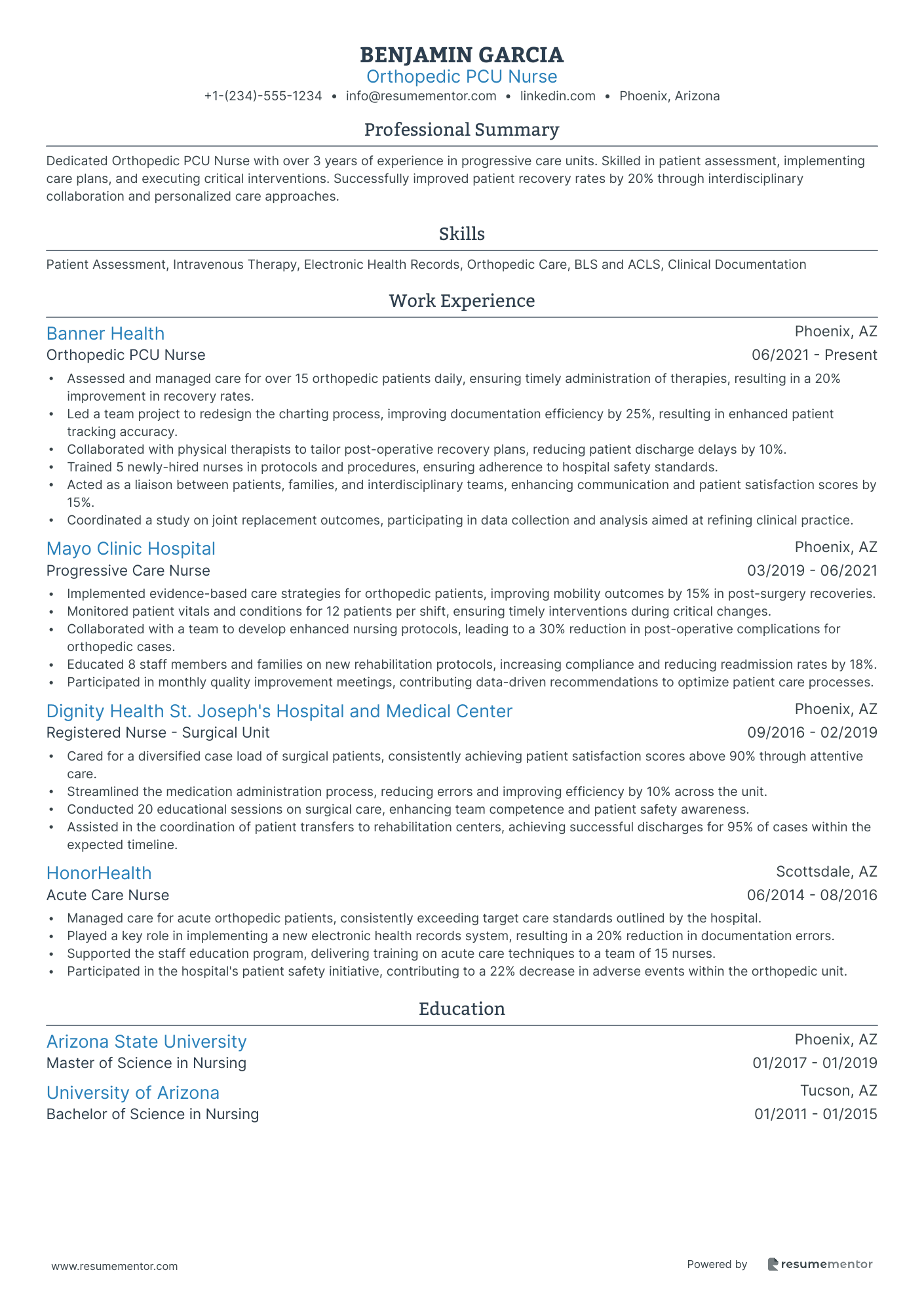
Orthopedic PCU Nurse
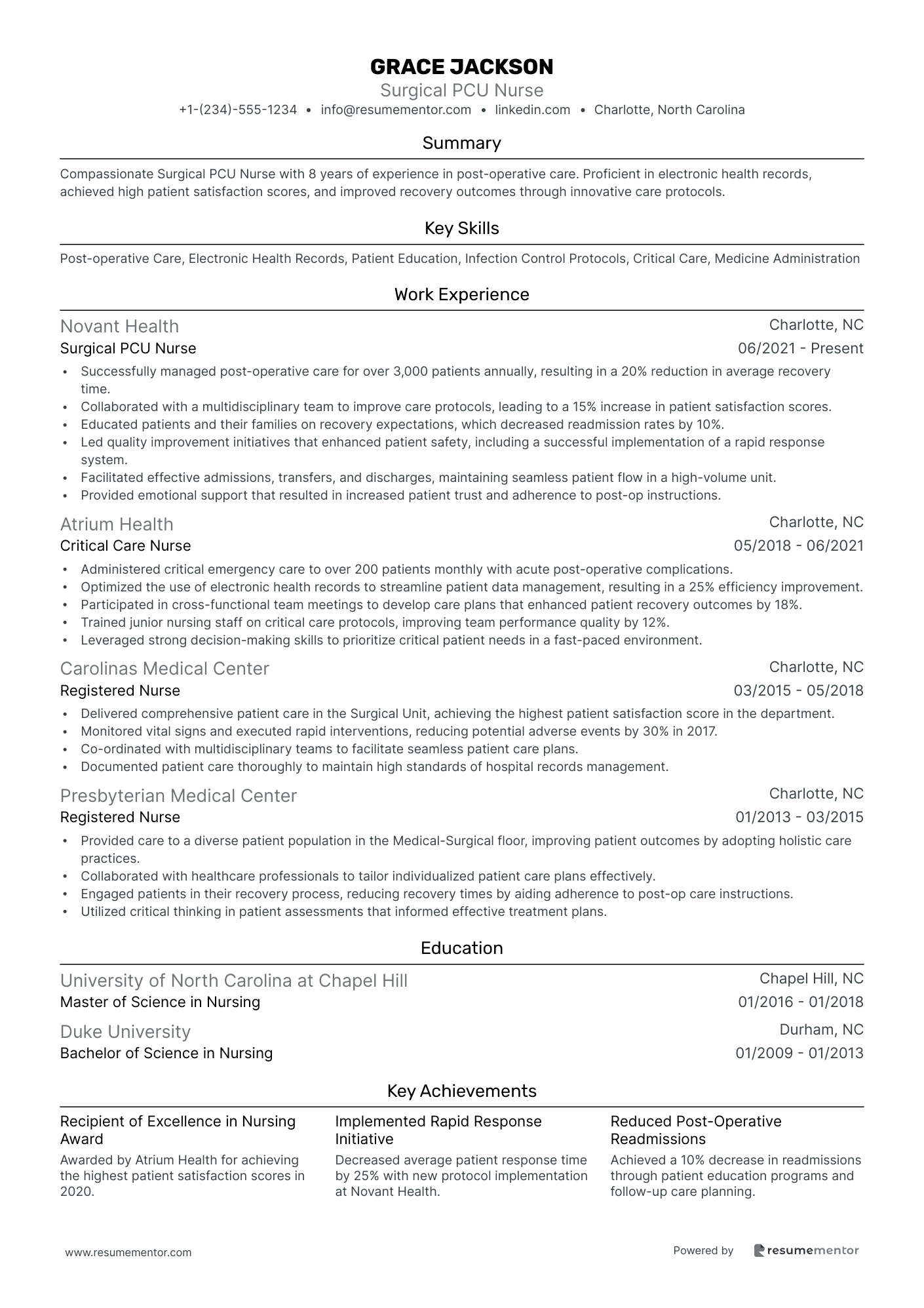
Surgical PCU Nurse
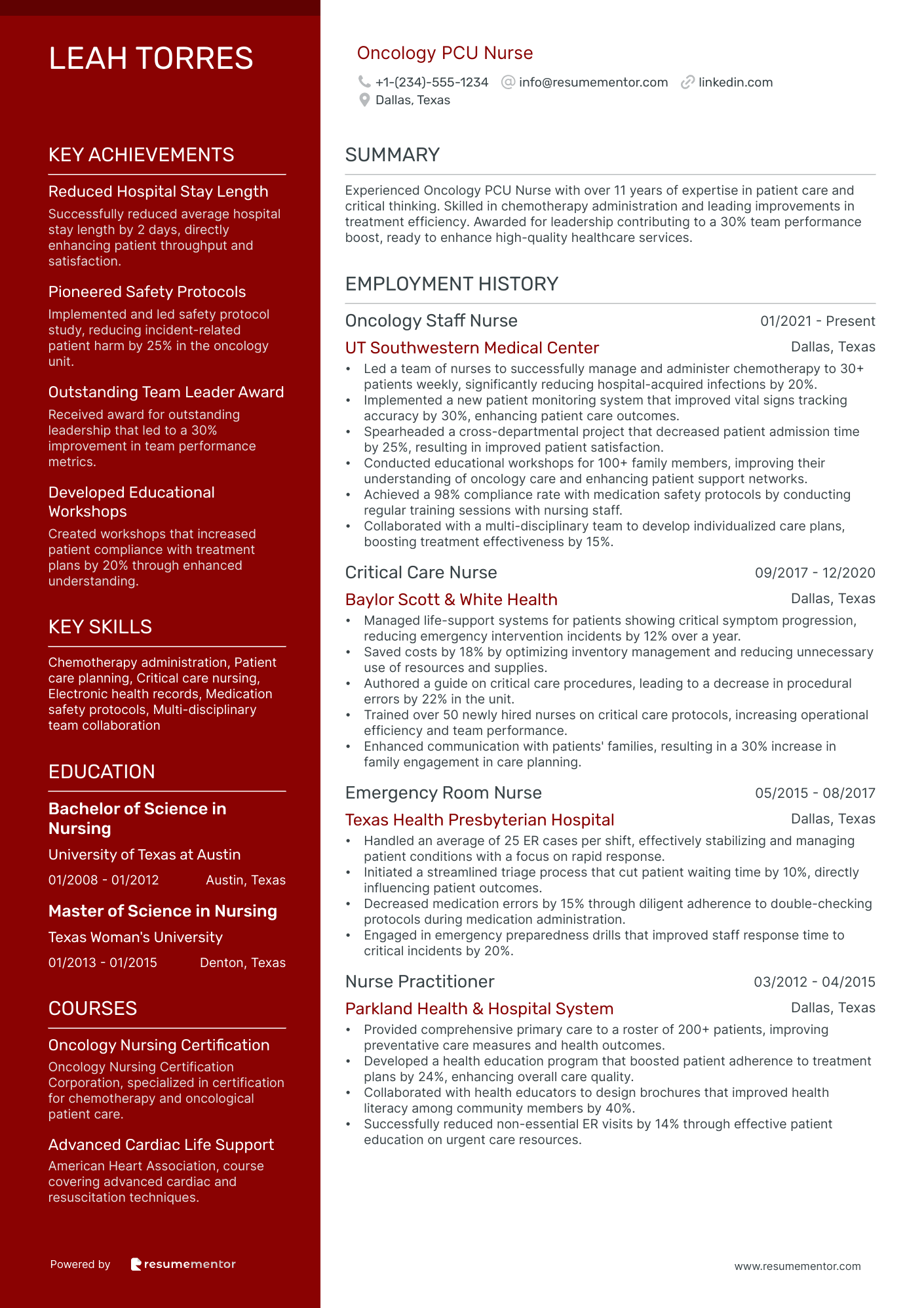
Oncology PCU Nurse
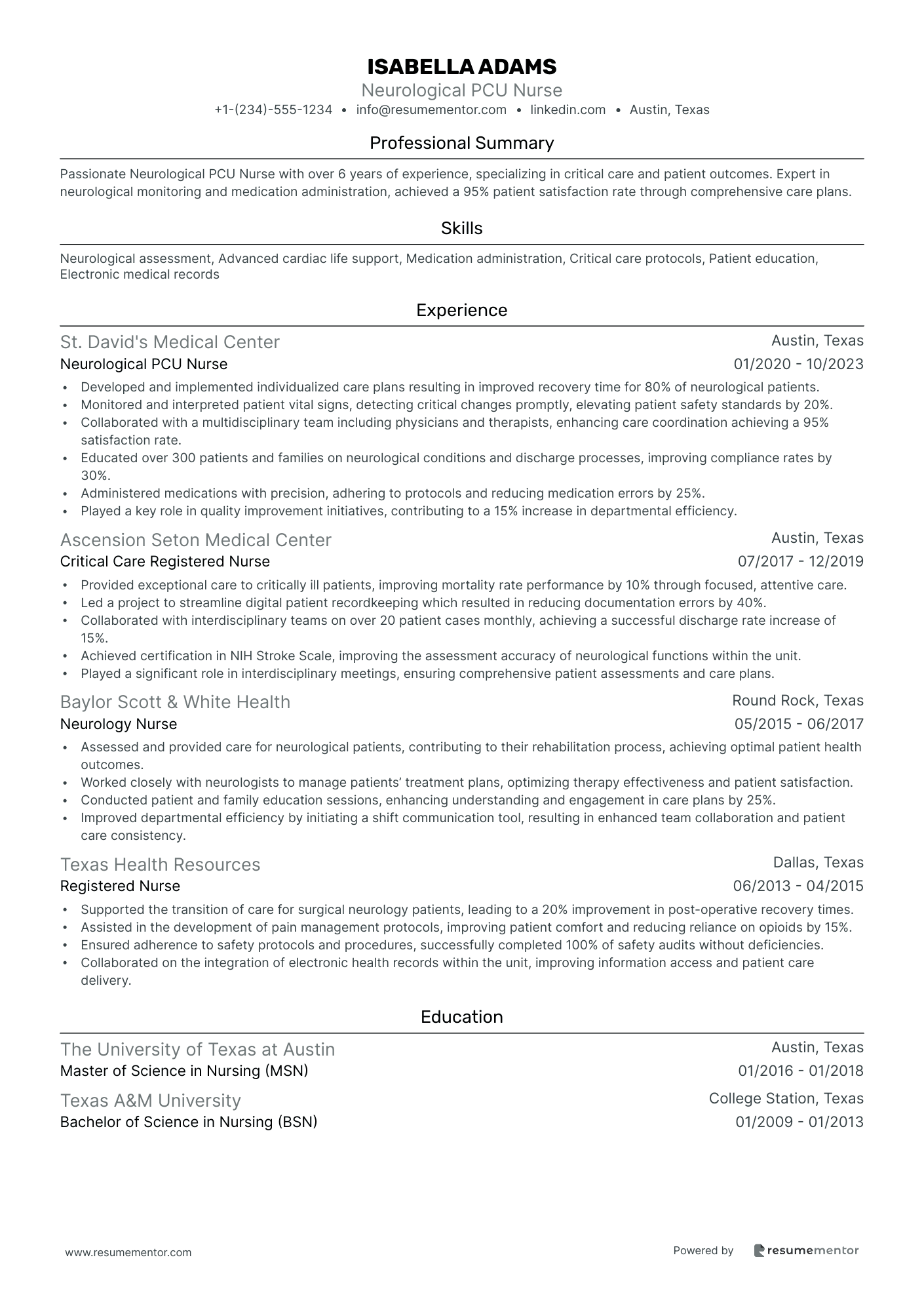
Neurological PCU Nurse
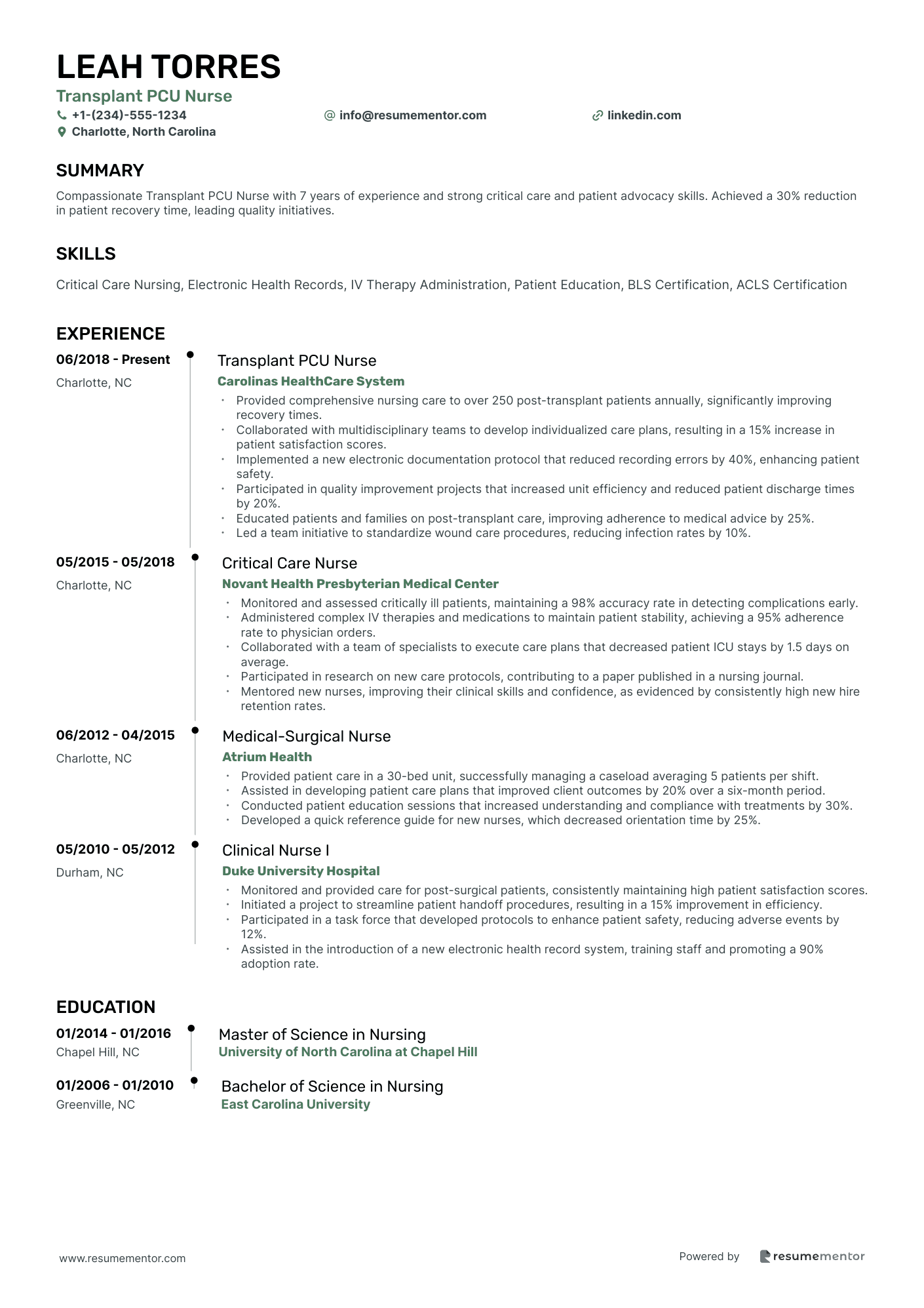
Transplant PCU Nurse
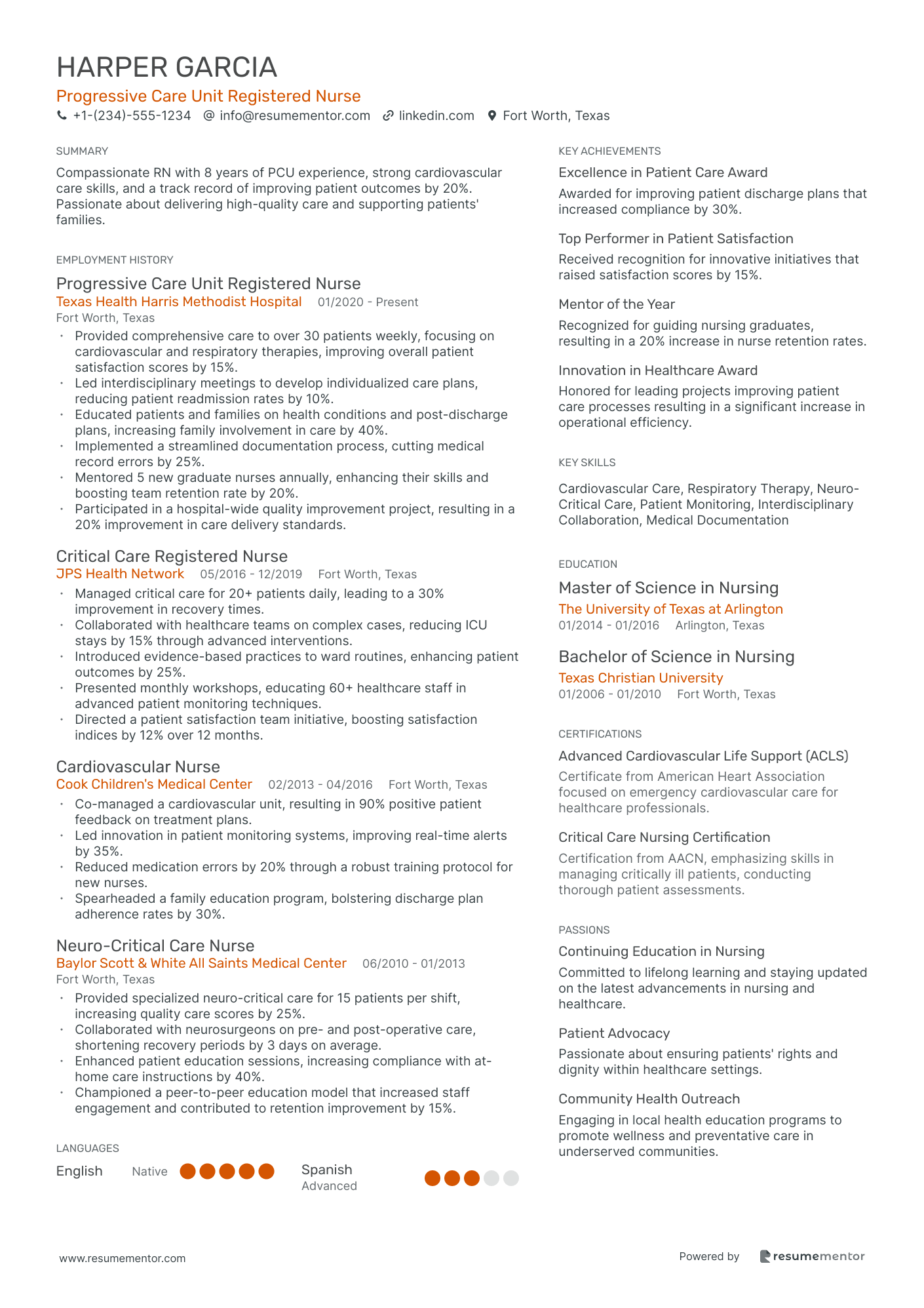
Progressive Care Unit Registered Nurse
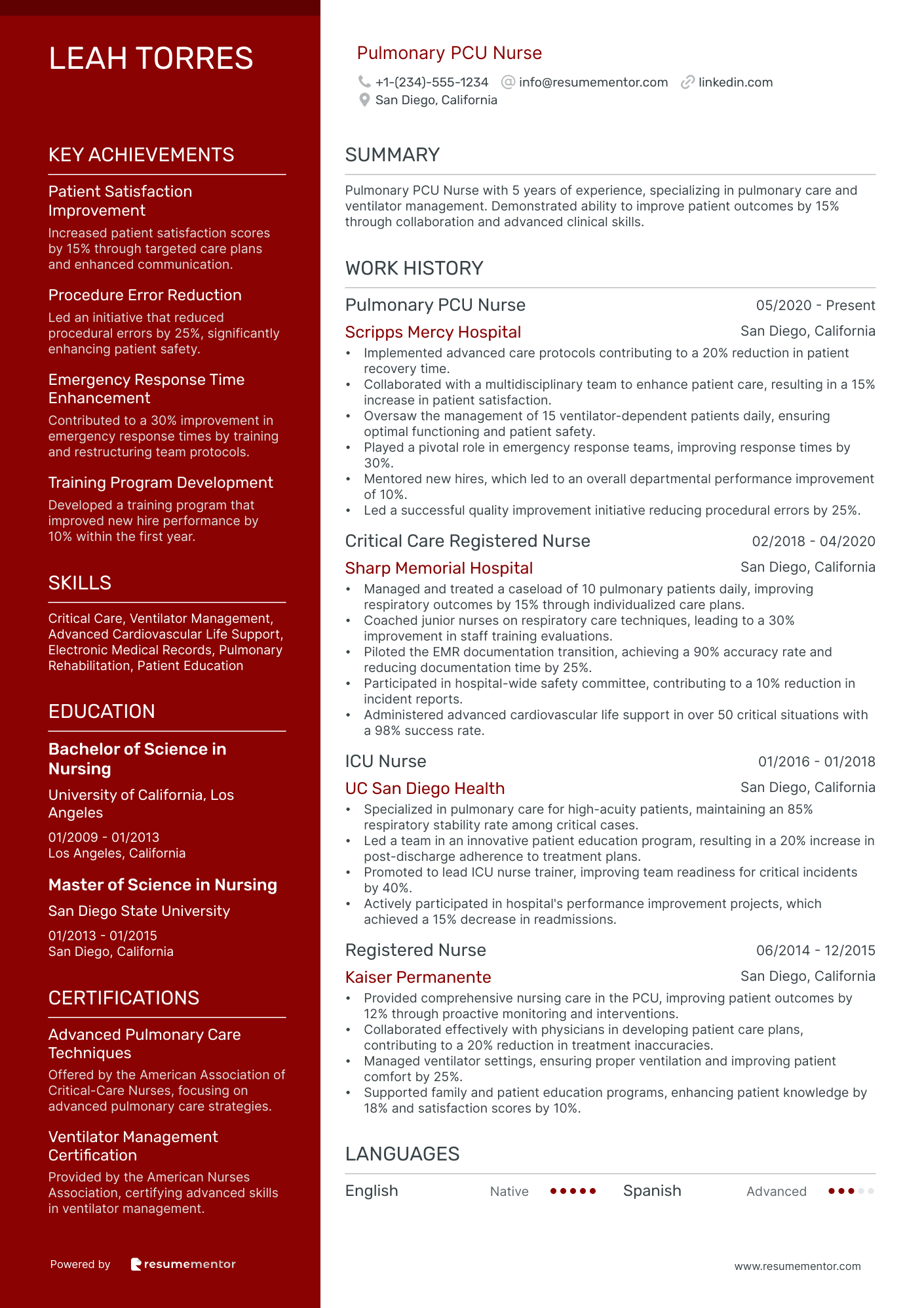
Pulmonary PCU Nurse

Cardiac PCU Nurse resume sample
- •Provided comprehensive care to a daily average of 8 cardiac patients, significantly improving patient satisfaction scores by 15% over one year.
- •Interpreted cardiac rhythms and implemented timely interventions that resulted in a 30% reduction in emergency incidents.
- •Collaborated closely with a multidisciplinary team to tailor individualized treatment plans, boosting treatment adherence by 25%.
- •Educated patients and families, leading to a 40% increase in patient knowledge retention on cardiac conditions and self-care.
- •Actively participated in quality improvement programs, helping increase departmental efficiency by 10%.
- •Ensured accurate documentation of patient data, decreasing record errors by 20% and enhancing clinical decision-making efficiency.
- •Managed telemetry monitoring for an average of 12 patients per shift, contributing to a 15% decrease in adverse cardiac events.
- •Enhanced patient discharge procedures, leading to a 10% reduction in follow-up hospital visits and improved care continuity.
- •Trained and mentored 5 junior nurses on telemetry best practices, achieving a 100% pass rate in advanced certification exams.
- •Participated in cross-disciplinary rounds, streamlining care coordination, which reduced average patient length of stay by 1.5 days.
- •Conducted patient education workshops, resulting in an overall improvement of 25% in patient self-care post-discharge.
- •Administered medications and monitored cardiac patients, contributing to a 98% compliance rate with treatment protocols.
- •Implemented a proactive monitoring system that resulted in early detection of complications, reducing adverse events by 18%.
- •Coordinated with specialists to expedite interventions, improving critical patient outcomes and reducing ICU transfers by 12%.
- •Initiated patient wellness programs that increased overall satisfaction and engagement by 30%.
- •Delivered high-quality nursing care to a diverse patient population, maintaining a patient satisfaction rate of 95%.
- •Conducted comprehensive assessments and interventions, streamlining patient care delivery by reducing wait times by 20%.
- •Provided training workshops for continuing education, resulting in increased nurse certification rates of 95%.
- •Led a team in implementing a patient-centered approach that reduced readmissions by 15% overall.
Pediatric PCU Nurse resume sample
- •Implemented a family-centered care initiative, increasing family satisfaction scores by 40% and improving patient engagement.
- •Led interdisciplinary rounds, collaborating with a team of 16 healthcare professionals to streamline patient care processes.
- •Conducted comprehensive assessments and interventions, resulting in a 25% reduction in hospital stay durations for pediatric patients.
- •Trained and mentored 12 new nurses on PCU protocols, fostering a knowledgeable and united team environment.
- •Enhanced medication administration procedures, reducing errors by 30% through targeted staff training.
- •Orchestrated 15 patient and family support sessions, empowering families with knowledge and emotional resilience.
- •Spearheaded a project to introduce electronic health record (EHR) documentation, decreasing documentation errors by 22%.
- •Monitored and intervened in complex patient cases, achieving rapid stabilization and enhancing care efficiency by up to 20%.
- •Collaborated with pediatric experts on care plans, leading to a 15% improvement in patient outcomes during my tenure.
- •Facilitated 15 educational workshops for families, improving awareness and understanding of pediatric care protocols.
- •Developed a comprehensive safety protocol for pediatric patients, resulting in a 10% reduction in incident reports.
- •Managed critical care needs for 30+ pediatric patients, contributing to a 20% improvement in patient recovery times.
- •Introduced a new patient monitoring system, resulting in a 15% increase in early detection of complications.
- •Provided thorough patient assessments, becoming a key member of a team that improved care efficiencies by 15%.
- •Organized regular training sessions on advanced pediatric life support, enhancing team skillsets and preparedness.
- •Implemented strategies to manage patient loads effectively, improving unit efficiency and patient care delivery by 20%.
- •Coordinated with multidisciplinary teams to tailor patient care plans, resulting in a 15% increase in treatment success rates.
- •Actively participated in hospital-wide quality improvement initiatives, contributing to a 10% rise in hospital service ratings.
- •Educated patients and families on care protocols, reinforcing understanding and compliance, reducing readmission rates by 5%.
Critical Care PCU Nurse resume sample
- •Led a team of 6 nurses in critical care unit, resulting in a 15% improvement in patient recovery times in 2022.
- •Managed the care of up to 15 high-acuity patients simultaneously, reducing emergency response times by 25%.
- •Administered complex medication regimens using cutting-edge technologies, maintaining a 98% accuracy rate.
- •Collaborated with interdisciplinary teams to tailor care plans, increasing treatment compliance rates by 20%.
- •Spearheaded infection control initiatives, achieving a 30% decrease in hospital-acquired infections over a 6-month period.
- •Developed and delivered training programs for new staff, enhancing skill proficiency by 35%.
- •Monitored vital signs of 12 high-risk patients daily, reporting critical changes within 2 minutes on average.
- •Enhanced patient care through advanced clinical assessments, increasing patient satisfaction scores by 23%.
- •Participated in development of electronic medical records protocols, improving documentation accuracy by 40%.
- •Educated families and patients on post-discharge care, reducing readmission rates by 18% within the first month.
- •Assisted in PCU redesign project, optimizing operational workflows to increase efficiency by 30%.
- •Provided comprehensive nursing care to critically ill patients, achieving a 95% treatment adherence rate.
- •Improved ICU patient outcomes by implementing evidence-based practices, reducing complications by 17%.
- •Collaborated with a cross-functional team to create individualized care plans, enhancing recovery rates by 10%.
- •Trained nursing interns in clinical skills, increasing their competency scores by 30% over a 3-month period.
- •Managed care for a diverse patient group, maintaining a 97% compliance rate with care plans.
- •Initiated a patient education program on chronic condition management, which led to a 20% drop in hospitalizations.
- •Collaborated with physicians on treatment strategies, enhancing patient engagement and recovery by 15%.
- •Assisted in implementing new ICU protocols, contributing to a 12% improvement in patient safety metrics.
Orthopedic PCU Nurse resume sample
- •Assessed and managed care for over 15 orthopedic patients daily, ensuring timely administration of therapies, resulting in a 20% improvement in recovery rates.
- •Led a team project to redesign the charting process, improving documentation efficiency by 25%, resulting in enhanced patient tracking accuracy.
- •Collaborated with physical therapists to tailor post-operative recovery plans, reducing patient discharge delays by 10%.
- •Trained 5 newly-hired nurses in protocols and procedures, ensuring adherence to hospital safety standards.
- •Acted as a liaison between patients, families, and interdisciplinary teams, enhancing communication and patient satisfaction scores by 15%.
- •Coordinated a study on joint replacement outcomes, participating in data collection and analysis aimed at refining clinical practice.
- •Implemented evidence-based care strategies for orthopedic patients, improving mobility outcomes by 15% in post-surgery recoveries.
- •Monitored patient vitals and conditions for 12 patients per shift, ensuring timely interventions during critical changes.
- •Collaborated with a team to develop enhanced nursing protocols, leading to a 30% reduction in post-operative complications for orthopedic cases.
- •Educated 8 staff members and families on new rehabilitation protocols, increasing compliance and reducing readmission rates by 18%.
- •Participated in monthly quality improvement meetings, contributing data-driven recommendations to optimize patient care processes.
- •Cared for a diversified case load of surgical patients, consistently achieving patient satisfaction scores above 90% through attentive care.
- •Streamlined the medication administration process, reducing errors and improving efficiency by 10% across the unit.
- •Conducted 20 educational sessions on surgical care, enhancing team competence and patient safety awareness.
- •Assisted in the coordination of patient transfers to rehabilitation centers, achieving successful discharges for 95% of cases within the expected timeline.
- •Managed care for acute orthopedic patients, consistently exceeding target care standards outlined by the hospital.
- •Played a key role in implementing a new electronic health records system, resulting in a 20% reduction in documentation errors.
- •Supported the staff education program, delivering training on acute care techniques to a team of 15 nurses.
- •Participated in the hospital's patient safety initiative, contributing to a 22% decrease in adverse events within the orthopedic unit.
Surgical PCU Nurse resume sample
- •Successfully managed post-operative care for over 3,000 patients annually, resulting in a 20% reduction in average recovery time.
- •Collaborated with a multidisciplinary team to improve care protocols, leading to a 15% increase in patient satisfaction scores.
- •Educated patients and their families on recovery expectations, which decreased readmission rates by 10%.
- •Led quality improvement initiatives that enhanced patient safety, including a successful implementation of a rapid response system.
- •Facilitated effective admissions, transfers, and discharges, maintaining seamless patient flow in a high-volume unit.
- •Provided emotional support that resulted in increased patient trust and adherence to post-op instructions.
- •Administered critical emergency care to over 200 patients monthly with acute post-operative complications.
- •Optimized the use of electronic health records to streamline patient data management, resulting in a 25% efficiency improvement.
- •Participated in cross-functional team meetings to develop care plans that enhanced patient recovery outcomes by 18%.
- •Trained junior nursing staff on critical care protocols, improving team performance quality by 12%.
- •Leveraged strong decision-making skills to prioritize critical patient needs in a fast-paced environment.
- •Delivered comprehensive patient care in the Surgical Unit, achieving the highest patient satisfaction score in the department.
- •Monitored vital signs and executed rapid interventions, reducing potential adverse events by 30% in 2017.
- •Co-ordinated with multidisciplinary teams to facilitate seamless patient care plans.
- •Documented patient care thoroughly to maintain high standards of hospital records management.
- •Provided care to a diverse patient population in the Medical-Surgical floor, improving patient outcomes by adopting holistic care practices.
- •Collaborated with healthcare professionals to tailor individualized patient care plans effectively.
- •Engaged patients in their recovery process, reducing recovery times by aiding adherence to post-op care instructions.
- •Utilized critical thinking in patient assessments that informed effective treatment plans.
Oncology PCU Nurse resume sample
- •Led a team of nurses to successfully manage and administer chemotherapy to 30+ patients weekly, significantly reducing hospital-acquired infections by 20%.
- •Implemented a new patient monitoring system that improved vital signs tracking accuracy by 30%, enhancing patient care outcomes.
- •Spearheaded a cross-departmental project that decreased patient admission time by 25%, resulting in improved patient satisfaction.
- •Conducted educational workshops for 100+ family members, improving their understanding of oncology care and enhancing patient support networks.
- •Achieved a 98% compliance rate with medication safety protocols by conducting regular training sessions with nursing staff.
- •Collaborated with a multi-disciplinary team to develop individualized care plans, boosting treatment effectiveness by 15%.
- •Managed life-support systems for patients showing critical symptom progression, reducing emergency intervention incidents by 12% over a year.
- •Saved costs by 18% by optimizing inventory management and reducing unnecessary use of resources and supplies.
- •Authored a guide on critical care procedures, leading to a decrease in procedural errors by 22% in the unit.
- •Trained over 50 newly hired nurses on critical care protocols, increasing operational efficiency and team performance.
- •Enhanced communication with patients' families, resulting in a 30% increase in family engagement in care planning.
- •Handled an average of 25 ER cases per shift, effectively stabilizing and managing patient conditions with a focus on rapid response.
- •Initiated a streamlined triage process that cut patient waiting time by 10%, directly influencing patient outcomes.
- •Decreased medication errors by 15% through diligent adherence to double-checking protocols during medication administration.
- •Engaged in emergency preparedness drills that improved staff response time to critical incidents by 20%.
- •Provided comprehensive primary care to a roster of 200+ patients, improving preventative care measures and health outcomes.
- •Developed a health education program that boosted patient adherence to treatment plans by 24%, enhancing overall care quality.
- •Collaborated with health educators to design brochures that improved health literacy among community members by 40%.
- •Successfully reduced non-essential ER visits by 14% through effective patient education on urgent care resources.
Neurological PCU Nurse resume sample
- •Developed and implemented individualized care plans resulting in improved recovery time for 80% of neurological patients.
- •Monitored and interpreted patient vital signs, detecting critical changes promptly, elevating patient safety standards by 20%.
- •Collaborated with a multidisciplinary team including physicians and therapists, enhancing care coordination achieving a 95% satisfaction rate.
- •Educated over 300 patients and families on neurological conditions and discharge processes, improving compliance rates by 30%.
- •Administered medications with precision, adhering to protocols and reducing medication errors by 25%.
- •Played a key role in quality improvement initiatives, contributing to a 15% increase in departmental efficiency.
- •Provided exceptional care to critically ill patients, improving mortality rate performance by 10% through focused, attentive care.
- •Led a project to streamline digital patient recordkeeping which resulted in reducing documentation errors by 40%.
- •Collaborated with interdisciplinary teams on over 20 patient cases monthly, achieving a successful discharge rate increase of 15%.
- •Achieved certification in NIH Stroke Scale, improving the assessment accuracy of neurological functions within the unit.
- •Played a significant role in interdisciplinary meetings, ensuring comprehensive patient assessments and care plans.
- •Assessed and provided care for neurological patients, contributing to their rehabilitation process, achieving optimal patient health outcomes.
- •Worked closely with neurologists to manage patients’ treatment plans, optimizing therapy effectiveness and patient satisfaction.
- •Conducted patient and family education sessions, enhancing understanding and engagement in care plans by 25%.
- •Improved departmental efficiency by initiating a shift communication tool, resulting in enhanced team collaboration and patient care consistency.
- •Supported the transition of care for surgical neurology patients, leading to a 20% improvement in post-operative recovery times.
- •Assisted in the development of pain management protocols, improving patient comfort and reducing reliance on opioids by 15%.
- •Ensured adherence to safety protocols and procedures, successfully completed 100% of safety audits without deficiencies.
- •Collaborated on the integration of electronic health records within the unit, improving information access and patient care delivery.
Transplant PCU Nurse resume sample
- •Provided comprehensive nursing care to over 250 post-transplant patients annually, significantly improving recovery times.
- •Collaborated with multidisciplinary teams to develop individualized care plans, resulting in a 15% increase in patient satisfaction scores.
- •Implemented a new electronic documentation protocol that reduced recording errors by 40%, enhancing patient safety.
- •Participated in quality improvement projects that increased unit efficiency and reduced patient discharge times by 20%.
- •Educated patients and families on post-transplant care, improving adherence to medical advice by 25%.
- •Led a team initiative to standardize wound care procedures, reducing infection rates by 10%.
- •Monitored and assessed critically ill patients, maintaining a 98% accuracy rate in detecting complications early.
- •Administered complex IV therapies and medications to maintain patient stability, achieving a 95% adherence rate to physician orders.
- •Collaborated with a team of specialists to execute care plans that decreased patient ICU stays by 1.5 days on average.
- •Participated in research on new care protocols, contributing to a paper published in a nursing journal.
- •Mentored new nurses, improving their clinical skills and confidence, as evidenced by consistently high new hire retention rates.
- •Provided patient care in a 30-bed unit, successfully managing a caseload averaging 5 patients per shift.
- •Assisted in developing patient care plans that improved client outcomes by 20% over a six-month period.
- •Conducted patient education sessions that increased understanding and compliance with treatments by 30%.
- •Developed a quick reference guide for new nurses, which decreased orientation time by 25%.
- •Monitored and provided care for post-surgical patients, consistently maintaining high patient satisfaction scores.
- •Initiated a project to streamline patient handoff procedures, resulting in a 15% improvement in efficiency.
- •Participated in a task force that developed protocols to enhance patient safety, reducing adverse events by 12%.
- •Assisted in the introduction of a new electronic health record system, training staff and promoting a 90% adoption rate.
Progressive Care Unit Registered Nurse resume sample
- •Provided comprehensive care to over 30 patients weekly, focusing on cardiovascular and respiratory therapies, improving overall patient satisfaction scores by 15%.
- •Led interdisciplinary meetings to develop individualized care plans, reducing patient readmission rates by 10%.
- •Educated patients and families on health conditions and post-discharge plans, increasing family involvement in care by 40%.
- •Implemented a streamlined documentation process, cutting medical record errors by 25%.
- •Mentored 5 new graduate nurses annually, enhancing their skills and boosting team retention rate by 20%.
- •Participated in a hospital-wide quality improvement project, resulting in a 20% improvement in care delivery standards.
- •Managed critical care for 20+ patients daily, leading to a 30% improvement in recovery times.
- •Collaborated with healthcare teams on complex cases, reducing ICU stays by 15% through advanced interventions.
- •Introduced evidence-based practices to ward routines, enhancing patient outcomes by 25%.
- •Presented monthly workshops, educating 60+ healthcare staff in advanced patient monitoring techniques.
- •Directed a patient satisfaction team initiative, boosting satisfaction indices by 12% over 12 months.
- •Co-managed a cardiovascular unit, resulting in 90% positive patient feedback on treatment plans.
- •Led innovation in patient monitoring systems, improving real-time alerts by 35%.
- •Reduced medication errors by 20% through a robust training protocol for new nurses.
- •Spearheaded a family education program, bolstering discharge plan adherence rates by 30%.
- •Provided specialized neuro-critical care for 15 patients per shift, increasing quality care scores by 25%.
- •Collaborated with neurosurgeons on pre- and post-operative care, shortening recovery periods by 3 days on average.
- •Enhanced patient education sessions, increasing compliance with at-home care instructions by 40%.
- •Championed a peer-to-peer education model that increased staff engagement and contributed to retention improvement by 15%.
Pulmonary PCU Nurse resume sample
- •Implemented advanced care protocols contributing to a 20% reduction in patient recovery time.
- •Collaborated with a multidisciplinary team to enhance patient care, resulting in a 15% increase in patient satisfaction.
- •Oversaw the management of 15 ventilator-dependent patients daily, ensuring optimal functioning and patient safety.
- •Played a pivotal role in emergency response teams, improving response times by 30%.
- •Mentored new hires, which led to an overall departmental performance improvement of 10%.
- •Led a successful quality improvement initiative reducing procedural errors by 25%.
- •Managed and treated a caseload of 10 pulmonary patients daily, improving respiratory outcomes by 15% through individualized care plans.
- •Coached junior nurses on respiratory care techniques, leading to a 30% improvement in staff training evaluations.
- •Piloted the EMR documentation transition, achieving a 90% accuracy rate and reducing documentation time by 25%.
- •Participated in hospital-wide safety committee, contributing to a 10% reduction in incident reports.
- •Administered advanced cardiovascular life support in over 50 critical situations with a 98% success rate.
- •Specialized in pulmonary care for high-acuity patients, maintaining an 85% respiratory stability rate among critical cases.
- •Led a team in an innovative patient education program, resulting in a 20% increase in post-discharge adherence to treatment plans.
- •Promoted to lead ICU nurse trainer, improving team readiness for critical incidents by 40%.
- •Actively participated in hospital's performance improvement projects, which achieved a 15% decrease in readmissions.
- •Provided comprehensive nursing care in the PCU, improving patient outcomes by 12% through proactive monitoring and interventions.
- •Collaborated effectively with physicians in developing patient care plans, contributing to a 20% reduction in treatment inaccuracies.
- •Managed ventilator settings, ensuring proper ventilation and improving patient comfort by 25%.
- •Supported family and patient education programs, enhancing patient knowledge by 18% and satisfaction scores by 10%.
As a progressive care unit (PCU) nurse, you weave compassion and precision into every patient interaction, creating a safety net for those in your care. However, translating these vital skills onto a resume can feel overwhelming—it’s like trying to capture the essence of your work in a single snapshot. While managing patient needs is second nature to you, translating your hands-on expertise into compelling words might not come as easily. But you don't have to face this challenge alone.
A resume isn't just a document; it's your ticket to the next step in your nursing journey. It highlights not only your medical expertise but also the passion and dedication you bring to patient care every day. Yet, without the right structure, even the most impressive experiences can get lost in translation.
This is where a resume template becomes invaluable. Using a resume template can organize your work history, education, and specialized PCU skills into a coherent and persuasive narrative. This structure allows you to focus less on formatting and more on showcasing your unique strengths and experiences in patient care.
When potential employers review your resume, it should reveal the skilled and compassionate nurse that you are. Let this guide assist you in crafting a resume that mirrors the dedication and expertise you bring to your role in the PCU. Dive in, and let's create a polished resume that opens doors to new opportunities in your nursing career.
Key Takeaways
- Use a resume template to organize your work history, education, and specialized PCU skills into a coherent narrative, allowing you to focus on showcasing your unique strengths.
- An effective PCU nurse resume should highlight your adaptability in high-stress environments and your comprehensive understanding of medical protocols.
- The resume's format should use a chronological order to showcase career progression, with a clean font and PDF format to ensure professional presentation.
- In the experience section, use quantifiable achievements and strong action words to convey your impact in previous roles, aligning them with the employer's needs.
- Highlight both hard and soft skills to demonstrate your technical abilities and interpersonal skills, essential for a PCU nurse role.
What to focus on when writing your PCU Nurse resume
Your PCU nurse resume should effectively convey your expertise in delivering specialized care to patients in a Progressive Care Unit, showcasing your ability to excel in high-stress environments. It's important to demonstrate your comprehensive understanding of medical protocols along with your skills in patient care and adaptability in fast-paced settings.
How to structure your PCU Nurse resume
- Contact Information—Begin your resume with your full name, phone number, email address, and LinkedIn URL. This section should ensure you are easily reachable, so double-check for accuracy. Using a professional email address related to your name adds a polished touch.
- Professional Summary—Craft a concise summary that captures your career highlights, focusing on your experience in PCU environments. Mention how you excel in aspects like patient advocacy or team collaboration, as these traits are valuable in nursing roles. Use this section to set the stage for the details that follow in your resume.
- Medical Expertise—In this section, emphasize skills like cardiac monitoring, post-operative care, and medication administration. Tailoring your expertise to the PCU setting by including specific equipment or care protocols you’re familiar with can set you apart from other applicants.
- Work Experience—Detail your previous nursing roles, focusing on your impact in the PCU. Highlight responsibilities that align with the requirements of the job you're applying for. Use metrics to provide evidence of your achievements, whether it’s improved patient outcomes or streamlined processes.
- Education and Certifications—Include your nursing degree, followed by certifications such as ACLS or PCCN. Mention continuous education efforts or specialized training, which can illustrate your commitment to remaining knowledgeable and competent in your field.
- Skills—Highlight key skills like critical thinking, patient assessment, and emergency response capabilities. Emphasize how these skills directly support your ability to provide high-quality patient care in progressive care settings.
Consider adding sections such as Volunteer Experience, Languages, or Professional Affiliations to enrich your resume. Now that you have a well-rounded overview, let’s dive deeper into each section to refine your resume format.
Which resume format to choose
Creating a resume as a PCU nurse is all about effectively showcasing your skills and experience. Start with the chronological format, which highlights your work history in a way that displays your career progression and stability clearly. This format helps employers quickly see your dedication and growth in the healthcare sector, particularly valuable in demonstrating your long-term commitment to patient care and the critical skills you've developed over time.
Font selection adds nuance to how your resume is perceived. Using clean, modern fonts like Lato, Montserrat, or Raleway can subtly communicate professionalism and attention to detail. While it might seem minor, the right font can make your resume easier to read, allowing hiring managers to focus on your substantive qualifications without distraction.
Choosing the right file type is crucial when finalizing your resume. A PDF is ideal because it preserves your formatting across different devices and platforms. This consistency ensures that the care you took in organizing and presenting your information isn’t lost, making sure your resume remains as impressive on an employer's screen as it was on yours.
Margins play a smaller, yet significant, role in your resume's presentation. Setting them at one inch on all sides provides a balanced, open look that allows your content to breathe. This not only makes your resume aesthetically pleasing but also easier to read, which is essential in making a strong, clear first impression.
By thoughtfully considering each element—from format and font to file type and margins—you can craft a resume that reflects your professionalism as a PCU nurse and sets you up for success in your job search.
How to write a quantifiable resume experience section
The experience section of your PCU nurse resume is essential for showcasing your journey and the unique value you offer. By emphasizing your role in patient care within the PCU, you highlight skills like monitoring patient conditions, administering medications, and collaborating with medical teams. Structuring this section in reverse chronological order brings your most recent and relevant experiences to the forefront, ensuring potential employers immediately see your growth. Focusing on the last 10-15 years allows you to demonstrate career progression, particularly in roles related to nursing and progressive care. Prioritizing relevant job titles like PCU Nurse or Progressive Care Nurse helps maintain a clear focus on your expertise. To ensure you're seen as the ideal candidate, tailoring your resume to each job ad by highlighting achievements that align with an employer's specific needs is crucial. Connectedly, using strong action words like “managed,” “coordinated,” “improved,” and “monitored” can effectively convey your leadership and initiative. Here's how you can bring all this together:
- •Managed a patient load of 5 high-acuity patients daily, achieving a patient satisfaction score of 98%.
- •Coordinated with a multidisciplinary team to decrease patient length of stay by 20%.
- •Improved medication administration accuracy by 15% through implementing a double-check protocol.
- •Monitored vital signs and lab results, identifying critical changes leading to a 30% reduction in emergency escalation.
This refined experience section is effective because it connects specific accomplishments to your professional skills, demonstrating more than just basic duties. By weaving in quantifiable results like boosting patient satisfaction and reducing hospital stay lengths, it builds a narrative of you as a problem-solver committed to exceptional patient care. Clear bullet points paint a vivid picture of your impact, helping you stand out in a crowded field. This format naturally aligns your experience with the employer’s needs, making it easy for them to see how your skills directly benefit their team. The consistent use of strong action words underscores your active role and contributions, ensuring the section is both clear and compelling.
Problem-Solving Focused resume experience section
A problem-solving-focused PCU nurse resume experience section should clearly demonstrate how your critical thinking and innovative approaches have led to significant improvements in patient care. Start by describing situations where solving problems positively impacted outcomes, underlining your role in initiating or contributing to successful solutions. Connect these experiences to your ability to enhance patient experiences or improve operational efficiency.
When crafting your bullet points, use powerful action verbs that highlight your achievements in concrete terms. Maintain a simple yet compelling narrative that threads through your examples, showcasing your contributions to better systems, higher patient satisfaction, or groundbreaking care methodologies. Incorporating numbers to quantify your successes gives employers a clear picture of your effectiveness and impact.
PCU Nurse
CareWell Hospital
June 2020 - Present
- Implemented a new patient monitoring system that cut response times by 30%, improving the speed of care.
- Created a workflow protocol for medication delivery, leading to a 25% reduction in errors.
- Spearheaded a project for a patient education program, raising satisfaction scores by 20%.
- Worked with doctors to craft personalized care plans, reducing patient readmissions by 15%.
Growth-Focused resume experience section
A growth-focused PCU nurse resume experience section should highlight your development and how you've positively impacted patient care. Begin with a header that clearly reflects your past achievements. Describe your accomplishments and the resulting benefits for patients and the facility, using straightforward language to make your successes stand out. This approach can illustrate how you've embraced new responsibilities and challenges.
Incorporate bullet points to detail your key successes, such as improving patient care processes, effectively collaborating with healthcare teams, and communicating efficiently. These examples should demonstrate your ability to adapt and grow professionally, which helps potential employers recognize your value in enhancing patient outcomes. Additionally, emphasize your commitment to continuous learning and professional improvement.
PCU Nurse
City Hospital
June 2018 - Present
- Managed care for a 25-bed PCU, improving patient satisfaction scores by 20% over two years.
- Streamlined patient handoff processes to reduce errors, collaborating with multidisciplinary teams.
- Developed and implemented a patient care protocol that decreased hospital readmissions by 10%.
- Trained and mentored 15 new nurses in PCU best practices and emergency procedures.
Innovation-Focused resume experience section
An innovation-focused PCU nurse resume experience section should effectively convey how your fresh ideas have enhanced patient care. Start by identifying times when your creative solutions made significant improvements, whether by streamlining processes or introducing new technology. Highlight examples where your initiatives have led to smoother operations, quicker patient recoveries, or more efficient workflows. This approach will help illustrate how your ability to innovate has positively impacted both your unit and patients.
Organize your experiences into well-defined bullet points, each reflecting a unique facet of your innovation-driven contributions. Clearly outline what you accomplished, the strategies you employed, and the outcomes you achieved. Using engaging and active language will help emphasize your achievements and keep the reader interested. By detailing specific projects where you proposed new ideas and led successful initiatives, you'll effectively demonstrate your strengths as a forward-thinking PCU nurse.
PCU Nurse
City Hospital
June 2021 - Present
- Created a digital tracking system to streamline patient observation, reducing errors by 30%.
- Introduced a new patient intake protocol, boosting registration efficiency by 25%.
- Led training sessions on the latest EHR updates, improving staff proficiency by 40%.
- Spearheaded a project to customize care plans using AI insights, enhancing patient recovery rates.
Skills-Focused resume experience section
A skills-focused PCU nurse resume experience section should clearly highlight your most relevant achievements and skills to stand out. Begin by emphasizing your accomplishments with specific numbers that demonstrate the impact of your work. For instance, saying how many patients you cared for or how your actions led to better outcomes can give employers a concrete sense of your value. This approach allows you to focus on essential skills for a PCU nurse, like delivering quality patient care, solving complex problems, managing emergencies, and collaborating effectively with teams.
To further enhance your resume, use strong action verbs that bring each of your achievements to life. Words like "managed," "implemented," or "streamlined" convey your initiative and leadership skills. This not only helps potential employers quickly understand your capabilities but also how well you fit the role you're interested in. By presenting concise and meaningful descriptions of your duties and successes, you effectively highlight the strengths that make you an exceptional progressive care nurse.
PCU Nurse
City Hospital
Jan 2021 - Present
- Monitored and assessed the condition of 8-12 patients per shift, leading to a 15% improvement in patient recovery times.
- Implemented a new patient care protocol that increased medication accuracy by 20%, reducing errors and enhancing patient safety.
- Collaborated with a team of 5 nurses and doctors to develop comprehensive care plans, improving patient satisfaction ratings by 30%.
- Trained and mentored 4 new nursing staff members, enhancing team efficiency and maintaining high standards of patient care.
Write your PCU Nurse resume summary section
A patient-focused PCU nurse resume summary should effectively showcase your skills and experience to make a lasting impression on potential employers. Your goal is to communicate your expertise and dedication concisely. If you have experience, using a summary instead of an objective is often more impactful because it emphasizes your past achievements. It's crucial to highlight your skills, certifications, and passion for patient care in just a few sentences. Quantifying your experience can also add weight to your summary. Consider using an example like this:
This summary connects your experience and dedication, providing a clear and compelling snapshot of your qualifications. Highlighting your dedication to patient health and your key certifications can set you apart. If you are a newcomer to the field, a resume objective highlighting your goals and potential contributions may be more appropriate. Unlike a summary that looks back at what you've accomplished, an objective focuses on your aspirations. A resume profile might blend skills with personal traits, offering a holistic view of who you are. Lastly, a summary of qualifications is often presented as a concise list. Each type serves to highlight your strengths and catch the employer's eye in different ways.
Listing your PCU Nurse skills on your resume
A skill-focused PCU nurse resume should clearly convey your strengths and abilities. You can emphasize skills in a standalone section or seamlessly weave them into your experience and summary. Highlight your strengths and soft skills to show how you effectively connect and communicate with patients and colleagues. On the other hand, hard skills represent the technical abilities you need to excel in patient care, like monitoring vital signs or operating medical equipment.
These skills do more than describe your capabilities; they also serve as important keywords for employers. Using these keywords can help your resume stand out in applicant tracking systems and catch the eye of hiring managers.
This example is effective because it directly and concisely lists crucial skills without unnecessary words. It highlights the important technical abilities that employers seek in PCU nursing roles. The choice of straightforward and relevant terms makes your resume easy to read for hiring professionals and computer systems alike.
Best hard skills to feature on your pcu nurse resume
For a PCU nurse, highlighting hard skills is essential to demonstrate your capacity to perform medical tasks and provide exceptional patient care. These skills should reflect your ability to handle medical equipment and cater to the specific needs of a progressive care unit.
Hard Skills
- Patient Monitoring
- Telemetry Interpretation
- Acute Care Techniques
- IV Therapy Administration
- Wound Care Management
- Medication Administration
- Care Planning and Coordination
- Infection Control
- Emergency Response
- Central Line Management
- Ventilator Care
- EKG Interpretation
- Blood Glucose Testing
- Pain Management
- Patient Safety Protocols
Best soft skills to feature on your pcu nurse resume
Equally important are the soft skills that reveal your interpersonal abilities and problem-solving capacity. These skills illustrate your talent for empathy, maintaining calmness, and effective collaboration in a high-pressure healthcare setting.
Soft Skills
- Communication
- Empathy
- Team Collaboration
- Problem-Solving
- Adaptability
- Attention to Detail
- Stress Management
- Critical Thinking
- Time Management
- Compassion
- Decision Making
- Conflict Resolution
- Patience
- Leadership
- Emotional Resilience
How to include your education on your resume
The education section of your resume is crucial because it showcases your academic background, especially for a Progressive Care Unit (PCU) nurse position. It should be tailored to fit the job application, which means focusing on relevant educational experiences and avoiding unrelated courses or degrees. When listing your degree, include the title, institution, and dates of attendance. Adding your GPA can be beneficial, especially if it is impressive. Typically, you should include it only if it's 3.5 or higher and for recent graduates. Mention any honors, such as cum laude, right next to your degree to highlight your academic achievements. Below are examples to illustrate the right way to present this section.
The second example is excellent because it directly relates to a PCU nurse position. It highlights a degree in nursing, includes an impressive GPA, and mentions the cum laude honor, all of which communicate academic excellence. By focusing on your relevant educational accomplishments, this section effectively strengthens your resume.
How to include PCU Nurse certificates on your resume
Including a certificates section in your resume as a PCU (Progressive Care Unit) nurse is important. It showcases your qualifications and specialized skills. You can also incorporate certificates in the header for quick visibility. List the name of the certificate clearly. Include the date you received it. Add the issuing organization to establish its credibility.
Here's how a certificate in the header could look: "R.N., BSN, CCRN". This immediately tells the reader about your qualifications.
A well-organized certificates section could be structured like this:
The example is strong because it includes certificates that are highly relevant to a PCU nurse role. The titles are clear and the issuing organizations are respected in the medical field. It ensures that anyone reading your resume understands your capabilities.
Extra sections to include in your PCU Nurse resume
As a Progressive Care Unit (PCU) nurse, your role is pivotal in ensuring patients receive outstanding care and attention during critical recovery phases. Crafting a comprehensive resume that emphasizes your skills, strengths, and diverse experiences can set you apart from other candidates.
Adding a language section to your resume showcases your ability to communicate with a broader range of patients and staff—mentioning proficiency in languages like Spanish or Mandarin can be particularly beneficial in diverse healthcare settings. Your multilingual skills can significantly enhance patient care and support within the PCU.
Including a hobbies and interests section can reveal your well-rounded personality and stress management skills—highlight interests such as yoga or gardening to show how you maintain a balanced and healthy lifestyle. This section can make you appear more relatable to potential employers.
Listing a volunteer work section can directly reflect your commitment to compassionate care—describe your experiences volunteering at local clinics or health fairs. Volunteer work demonstrates your dedication to helping others and willingness to go beyond professional obligations.
Adding a books section can illustrate your commitment to continuous learning—list influential reads like “The ICU Book” by Paul Marino. This will show employers that you are actively expanding your knowledge of critical care.
In Conclusion
In conclusion, as a PCU nurse, your resume is not just a summary of your qualifications but a reflection of your dedication and skill in patient care. By utilizing a clearly structured format, you can effectively showcase your expertise, experience, and accomplishments. Start with a strong professional summary that highlights your dedication and key certifications. Organize your experience section to emphasize your impact in patient care, using quantifiable results and strong action verbs. Highlight both your hard skills, such as patient monitoring and medication administration, and your soft skills, like empathy and communication, to give a comprehensive picture of your abilities. Don't overlook the importance of including relevant education and certifications, ensuring each entry is clearly presented and directly pertinent to the role. Consider adding sections like languages, hobbies, and volunteer experiences, each revealing different aspects of your capability and dedication. Through careful selection and presentation of each element, your resume will stand out to potential employers, showcasing you as an exceptional candidate ready to succeed in any PCU nursing position. With this attention to detail, your resume can become a powerful tool in advancing your nursing career.
Related Articles

Continue Reading
Check more recommended readings to get the job of your dreams.
Resume
Resources
Tools
© 2026. All rights reserved.
Made with love by people who care.

